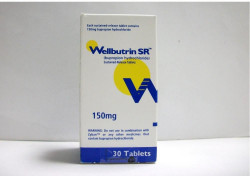Wellbutrin SR (bupropion) Coupons, Discounts & Cost
Wellbutrin SR (bupropion) is an atypical antidepressant. The drug is also used for the treatment of nicotine addiction. One way to save money on the Wellbutrin SR (bupropion) retail cost regardless of income and insurance status is to use Wellbutrin SR (bupropion) coupons or discount cards from RXCoupons. Use our Bupropion coupons at your online pharmacy and receive up to 75% off the sale price each time you refill your prescription.
Benefits of Wellbutrin SR
Wellbutrin SR (bupropion) is a drug for the treatment of depressive disorders of various origins. If the patient responds positively to treatment, then continued therapy with Wellbutrin SR is effective in preventing the recurrence of depressive episodes in the future.
The initial dose for bupropion is 150 mg once a day. The maximum single dose should not exceed 150 mg. Higher doses should be consumed in two divided doses with an interval of not less than 8 hours. The full antidepressant effect may occur no sooner than a few weeks after you’ve started Wellbutrin SR therapy. The drug should be used with caution in patients with impaired liver function.
Approximately 87% of bupropion is excreted in urine and up to 10% with feces.
Wellbutrin SR dosage and administration
Wellbutrin SR tablets should be swallowed whole (do not break and do not chew them).
The initial dose is 150 mg twice a day. The maximum single dose for adults should not exceed 200 mg. Wellbutrin SR tablets should be used in two divided doses (in the morning and evening).
Some patients taking Wellbutrin SR tablets may suffer from insomnia. However, you can reduce the frequency of unwanted effects if you refrain from using the drug before bedtime.
The final effect can be seen only after several weeks of treatment.
Patients may increase the dose up to 400 mg per day (200 mg twice a day) if there is no improvement.
Supportive therapy: acute episodes of depression should be treated for at least six months. It was found that Wellbutrin SR at a dose of 300 mg per day is effective for a long treatment period (up to 1 year).
It may be necessary to reduce the dose of the drug for elderly patients (risk of renal failure).
Patients with impaired renal function should start the therapy with lower doses.
Wellbutrin SR should be used with caution in patients with impaired hepatic function. The dose should not exceed 150 mg every other day in patients with severe cirrhosis of the liver.
Information about Wellbutrin SR side effects
Cardiovascular system: tachycardia, palpitations, postural hypotension, high blood pressure.
CNS: cramps, insomnia, dystonia, tremor, ataxia, Parkinsonism, headache, dizziness, depression, disorientation, delirium, hallucinations, agitation, anxiety, irritability, unusual dreams, memory problems, paresthesia.
Endocrine system: anorexia, weight loss.
Digestive system: dry mouth, gastrointestinal disorders (including nausea and vomiting), abdominal pain, constipation.
Hepatobiliary system: jaundice, hepatitis.
Urogenital tract: increased frequency of urination.
Allergic reactions: rash, itching, sweating, hives, vascular edema, bronchospasm, anaphylactic shock, arthralgia, myalgia and fever.
When you should not use Wellbutrin SR
Wellbutrin SR is contraindicated in patients with hypersensitivity to bupropion, convulsive disorders, bulimia nervosa or anorexia. These tablets should not be given to patients receiving any other drug containing bupropion.
Wellbutrin SR is contraindicated in patients who have suddenly stopped taking alcohol or sedatives.
It is contraindicated to use MAO inhibitors and Wellbutrin SR.
Learn about Wellbutrin SR special warnings
Do not exceed the recommended dose of Wellbutrin SR (up to 400 mg per day).
The drug should be given with particular caution to patients with head trauma, tumors of the central nervous system, convulsions, diabetes.
Treatment should be discontinued if patients have symptoms of hypersensitivity. Keep in mind that these symptoms can persist even after the drug has been discontinued.
Wellbutrin SR should be used with caution in patients with liver pathology (mild to moderate liver cirrhosis). This drug should be given with extreme caution in patients with severe cirrhosis of the liver. These patients should choose reduced dosing frequency. All patients with liver pathology should be carefully examined for possible side effects (insomnia, dry mouth, convulsions).
Symptoms of a depressed state may worsen in patients with depression, regardless of whether they take antidepressant drugs or not. Therefore, such patients should be monitored closely (especially at the beginning of the course of treatment).
Patients with suicidal thoughts or behavior (especially if these symptoms are severe) should change their treatment plan.

